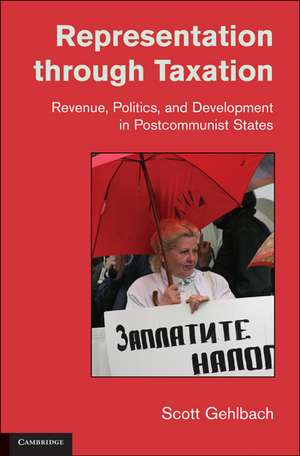Representation through Taxation: Revenue, Politics, and Development in Postcommunist States: Cambridge Studies in Comparative Politics
Autor Scott Gehlbachen Limba Engleză Paperback – 12 sep 2010
| Toate formatele și edițiile | Preț | Express |
|---|---|---|
| Paperback (1) | 282.26 lei 6-8 săpt. | |
| Cambridge University Press – 12 sep 2010 | 282.26 lei 6-8 săpt. | |
| Hardback (1) | 480.32 lei 6-8 săpt. | |
| Cambridge University Press – 7 sep 2008 | 480.32 lei 6-8 săpt. |
Din seria Cambridge Studies in Comparative Politics
-
 Preț: 233.13 lei
Preț: 233.13 lei -
 Preț: 267.61 lei
Preț: 267.61 lei -
 Preț: 239.36 lei
Preț: 239.36 lei -
 Preț: 185.64 lei
Preț: 185.64 lei -
 Preț: 160.82 lei
Preț: 160.82 lei -
 Preț: 206.52 lei
Preț: 206.52 lei - 9%
 Preț: 594.68 lei
Preț: 594.68 lei -
 Preț: 225.70 lei
Preț: 225.70 lei -
 Preț: 164.94 lei
Preț: 164.94 lei -
 Preț: 206.71 lei
Preț: 206.71 lei -
 Preț: 236.42 lei
Preț: 236.42 lei -
 Preț: 358.38 lei
Preț: 358.38 lei -
 Preț: 231.82 lei
Preț: 231.82 lei -
 Preț: 257.82 lei
Preț: 257.82 lei -
 Preț: 264.74 lei
Preț: 264.74 lei -
 Preț: 269.58 lei
Preț: 269.58 lei -
 Preț: 201.24 lei
Preț: 201.24 lei -
 Preț: 232.45 lei
Preț: 232.45 lei -
 Preț: 203.42 lei
Preț: 203.42 lei -
 Preț: 191.12 lei
Preț: 191.12 lei -
 Preț: 158.77 lei
Preț: 158.77 lei -
 Preț: 199.05 lei
Preț: 199.05 lei -
 Preț: 288.80 lei
Preț: 288.80 lei -
 Preț: 388.29 lei
Preț: 388.29 lei -
 Preț: 288.04 lei
Preț: 288.04 lei - 11%
 Preț: 695.06 lei
Preț: 695.06 lei - 11%
 Preț: 553.80 lei
Preț: 553.80 lei -
 Preț: 262.06 lei
Preț: 262.06 lei - 11%
 Preț: 691.66 lei
Preț: 691.66 lei -
 Preț: 228.00 lei
Preț: 228.00 lei -
 Preț: 385.28 lei
Preț: 385.28 lei -
 Preț: 312.89 lei
Preț: 312.89 lei -
 Preț: 224.44 lei
Preț: 224.44 lei -
 Preț: 287.07 lei
Preț: 287.07 lei -
 Preț: 251.27 lei
Preț: 251.27 lei -
 Preț: 313.70 lei
Preț: 313.70 lei -
 Preț: 277.38 lei
Preț: 277.38 lei -
 Preț: 423.79 lei
Preț: 423.79 lei - 11%
 Preț: 552.94 lei
Preț: 552.94 lei - 11%
 Preț: 554.43 lei
Preț: 554.43 lei - 14%
 Preț: 783.26 lei
Preț: 783.26 lei - 11%
 Preț: 584.04 lei
Preț: 584.04 lei -
 Preț: 228.60 lei
Preț: 228.60 lei
Preț: 282.26 lei
Nou
Puncte Express: 423
Preț estimativ în valută:
54.02€ • 56.19$ • 44.59£
54.02€ • 56.19$ • 44.59£
Carte tipărită la comandă
Livrare economică 15-29 aprilie
Preluare comenzi: 021 569.72.76
Specificații
ISBN-13: 9780521168809
ISBN-10: 0521168805
Pagini: 216
Ilustrații: 29 b/w illus. 16 tables
Dimensiuni: 152 x 229 x 12 mm
Greutate: 0.32 kg
Editura: Cambridge University Press
Colecția Cambridge University Press
Seria Cambridge Studies in Comparative Politics
Locul publicării:New York, United States
ISBN-10: 0521168805
Pagini: 216
Ilustrații: 29 b/w illus. 16 tables
Dimensiuni: 152 x 229 x 12 mm
Greutate: 0.32 kg
Editura: Cambridge University Press
Colecția Cambridge University Press
Seria Cambridge Studies in Comparative Politics
Locul publicării:New York, United States
Cuprins
1. Taxes, representation, and economic development in the Russian heartland; 2. The creation of tax systems; 3. The logic of representation through taxation; 4. Patterns of collective-goods provision; 5. Revenue traps; 6. Conclusions.
Recenzii
'Why do different postcommunist governments pursue differing investment strategies? Gehlbach shows that game theory and econometrics, when combined with expert area knowledge, produces an interesting answer, namely, that given some sets of conditions, governments invest inefficiently so as to maximize their tax revenue.' Nathaniel Beck, New York University
'Scott Gehlbach has written a terrific book that should be required reading for scholars of taxation, state capacity, and interest group politics. Whereas the exchange of political favors for tax payments is often treated as unproblematic, both politicians and firms have an incentive to renege on this 'contract' ex post. Gehlbach finds that to mitigate this incentive problem politicians reward firms in sectors that are easier to tax because they can be more confident that the firms are abiding by the contract. He makes the case with an impressive array of formal theory, statistical methods, and deep knowledge of the postcommunist world. By recognizing 'taxability' as a determinant of policy bias, Gehlbach makes an important and original contribution that opens new avenues for research.' Timothy Frye, Professor, Department of Political Science and the Harriman Institute, Columbia University
'This dazzling, well-written book employs formal models and empirical analysis to make us rethink the political economy of taxation and its relationship to economic development. Gehlbach shows that post-Soviet governments desperate for tax revenues and large, inefficient enterprises seeking to survive found common purpose in a tax system favoring big firms because their tax compliance was more likely than that of relatively efficient smaller firms. But in the long-run this tax system has stifled economic growth and created a 'revenue trap' that weakens the state's ability to support development.' Cynthia Kaplan, University of California, Santa Barbara
'Representation Through Taxation is an innovative work of what Schumpeter called fiscal sociology. It traces the battles between business and the state over taxation in postcommunist Eastern Europe and the former Soviet Union, and challenges much conventional wisdom on the subject. Rather than just supporting the growth of business and then trying to tax it, Gehlbach argues that postcommunist states selectively supported the kind of businesses that are easy to tax. This, he contends, shaped the patterns of taxation and economic development across the region. Scrupulously researched, the book is a provocative and insightful contribution to our understanding of the political economy of reform.' Daniel Treisman, University of California, Los Angeles
'Scott Gehlbach's well-written book is an important contribution both to positive political economy and to the study of post-communist transition. … an innovative application of formal political theory which is likely to stimulate a wealth of future research.' Europe-Asia Studies
'Scott Gehlbach has written a terrific book that should be required reading for scholars of taxation, state capacity, and interest group politics. Whereas the exchange of political favors for tax payments is often treated as unproblematic, both politicians and firms have an incentive to renege on this 'contract' ex post. Gehlbach finds that to mitigate this incentive problem politicians reward firms in sectors that are easier to tax because they can be more confident that the firms are abiding by the contract. He makes the case with an impressive array of formal theory, statistical methods, and deep knowledge of the postcommunist world. By recognizing 'taxability' as a determinant of policy bias, Gehlbach makes an important and original contribution that opens new avenues for research.' Timothy Frye, Professor, Department of Political Science and the Harriman Institute, Columbia University
'This dazzling, well-written book employs formal models and empirical analysis to make us rethink the political economy of taxation and its relationship to economic development. Gehlbach shows that post-Soviet governments desperate for tax revenues and large, inefficient enterprises seeking to survive found common purpose in a tax system favoring big firms because their tax compliance was more likely than that of relatively efficient smaller firms. But in the long-run this tax system has stifled economic growth and created a 'revenue trap' that weakens the state's ability to support development.' Cynthia Kaplan, University of California, Santa Barbara
'Representation Through Taxation is an innovative work of what Schumpeter called fiscal sociology. It traces the battles between business and the state over taxation in postcommunist Eastern Europe and the former Soviet Union, and challenges much conventional wisdom on the subject. Rather than just supporting the growth of business and then trying to tax it, Gehlbach argues that postcommunist states selectively supported the kind of businesses that are easy to tax. This, he contends, shaped the patterns of taxation and economic development across the region. Scrupulously researched, the book is a provocative and insightful contribution to our understanding of the political economy of reform.' Daniel Treisman, University of California, Los Angeles
'Scott Gehlbach's well-written book is an important contribution both to positive political economy and to the study of post-communist transition. … an innovative application of formal political theory which is likely to stimulate a wealth of future research.' Europe-Asia Studies
Notă biografică
Descriere
Gehlbach challenges the conventional wisdom about the relationship between politicians and organized interests.









